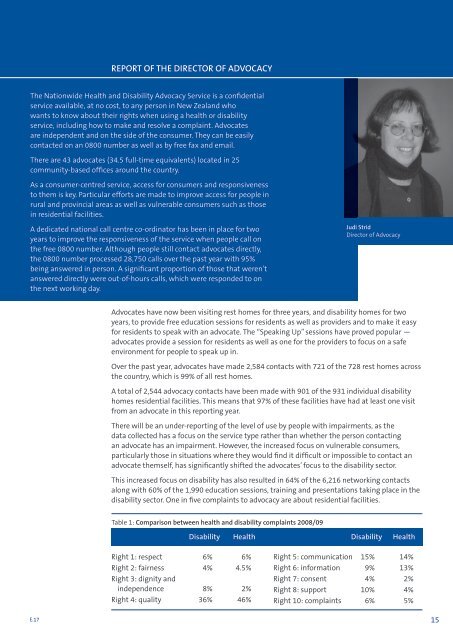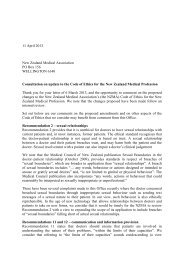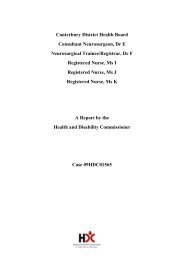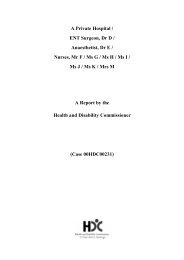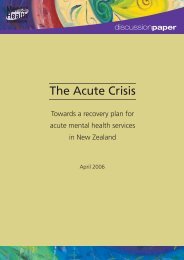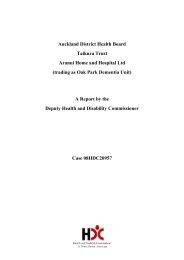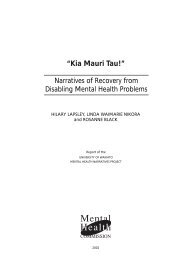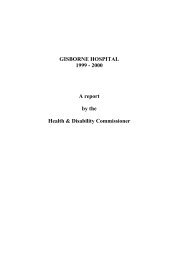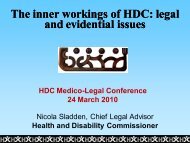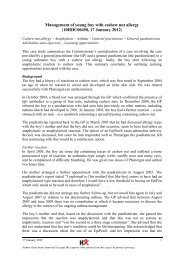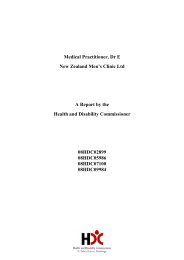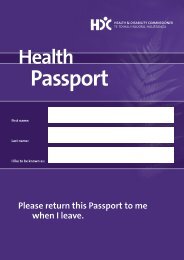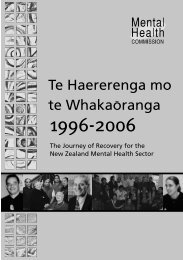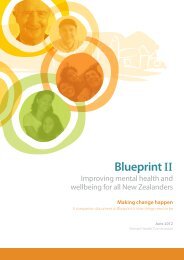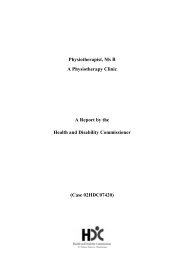Annual Report for the year ended 30 June 2009 - Health and ...
Annual Report for the year ended 30 June 2009 - Health and ...
Annual Report for the year ended 30 June 2009 - Health and ...
Create successful ePaper yourself
Turn your PDF publications into a flip-book with our unique Google optimized e-Paper software.
REPORT OF THE DIRECTOR OF ADVOCACY<br />
The Nationwide <strong>Health</strong> <strong>and</strong> Disability Advocacy Service is a confidential<br />
service available, at no cost, to any person in New Zeal<strong>and</strong> who<br />
wants to know about <strong>the</strong>ir rights when using a health or disability<br />
service, including how to make <strong>and</strong> resolve a complaint. Advocates<br />
are independent <strong>and</strong> on <strong>the</strong> side of <strong>the</strong> consumer. They can be easily<br />
contacted on an 0800 number as well as by free fax <strong>and</strong> email.<br />
There are 43 advocates (34.5 full-time equivalents) located in 25<br />
community-based offices around <strong>the</strong> country.<br />
As a consumer-centred service, access <strong>for</strong> consumers <strong>and</strong> responsiveness<br />
to <strong>the</strong>m is key. Particular ef<strong>for</strong>ts are made to improve access <strong>for</strong> people in<br />
rural <strong>and</strong> provincial areas as well as vulnerable consumers such as those<br />
in residential facilities.<br />
A dedicated national call centre co-ordinator has been in place <strong>for</strong> two<br />
<strong>year</strong>s to improve <strong>the</strong> responsiveness of <strong>the</strong> service when people call on<br />
<strong>the</strong> free 0800 number. Although people still contact advocates directly,<br />
<strong>the</strong> 0800 number processed 28,750 calls over <strong>the</strong> past <strong>year</strong> with 95%<br />
being answered in person. A significant proportion of those that weren’t<br />
answered directly were out-of-hours calls, which were responded to on<br />
<strong>the</strong> next working day.<br />
Judi Strid<br />
Director of Advocacy<br />
Advocates have now been visiting rest homes <strong>for</strong> three <strong>year</strong>s, <strong>and</strong> disability homes <strong>for</strong> two<br />
<strong>year</strong>s, to provide free education sessions <strong>for</strong> residents as well as providers <strong>and</strong> to make it easy<br />
<strong>for</strong> residents to speak with an advocate. The “Speaking Up” sessions have proved popular —<br />
advocates provide a session <strong>for</strong> residents as well as one <strong>for</strong> <strong>the</strong> providers to focus on a safe<br />
environment <strong>for</strong> people to speak up in.<br />
Over <strong>the</strong> past <strong>year</strong>, advocates have made 2,584 contacts with 721 of <strong>the</strong> 728 rest homes across<br />
<strong>the</strong> country, which is 99% of all rest homes.<br />
A total of 2,544 advocacy contacts have been made with 901 of <strong>the</strong> 931 individual disability<br />
homes residential facilities. This means that 97% of <strong>the</strong>se facilities have had at least one visit<br />
from an advocate in this reporting <strong>year</strong>.<br />
There will be an under-reporting of <strong>the</strong> level of use by people with impairments, as <strong>the</strong><br />
data collected has a focus on <strong>the</strong> service type ra<strong>the</strong>r than whe<strong>the</strong>r <strong>the</strong> person contacting<br />
an advocate has an impairment. However, <strong>the</strong> increased focus on vulnerable consumers,<br />
particularly those in situations where <strong>the</strong>y would find it difficult or impossible to contact an<br />
advocate <strong>the</strong>mself, has significantly shifted <strong>the</strong> advocates’ focus to <strong>the</strong> disability sector.<br />
This increased focus on disability has also resulted in 64% of <strong>the</strong> 6,216 networking contacts<br />
along with 60% of <strong>the</strong> 1,990 education sessions, training <strong>and</strong> presentations taking place in <strong>the</strong><br />
disability sector. One in five complaints to advocacy are about residential facilities.<br />
Table 1: Comparison between health <strong>and</strong> disability complaints 2008/09<br />
Disability <strong>Health</strong> Disability <strong>Health</strong><br />
Right 1: respect 6% 6%<br />
Right 2: fairness 4% 4.5%<br />
Right 3: dignity <strong>and</strong><br />
independence 8% 2%<br />
Right 4: quality 36% 46%<br />
Right 5: communication 15% 14%<br />
Right 6: in<strong>for</strong>mation 9% 13%<br />
Right 7: consent 4% 2%<br />
Right 8: support 10% 4%<br />
Right 10: complaints 6% 5%<br />
E.17<br />
15


